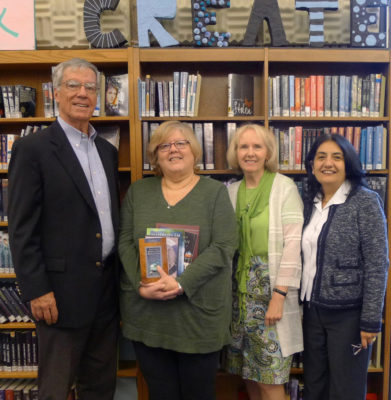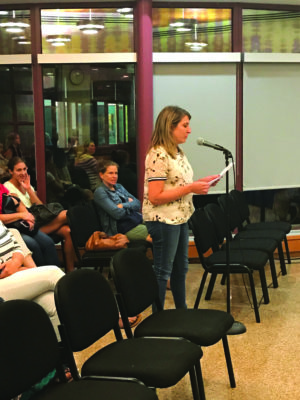
According to theology researchers, there are 4,200 religions around the world. Of those, eight are represented on the Chappaqua Interfaith Council. The small, but dedicated group of Baha’is, which counts eight to 10 member families on average is an avid member of the Council and has enjoyed being part of the Chappaqua community for almost 50 and years.
The Chappaqua group recently made a book donation to the local library to commemorate the 200th bicentenary of the birth of Baha’u’llah, its founder. It’s not surprising though that this group has embedded itself within the fabric of its communities despite its small numbers. The central message of the Baha’i teachings, after all, is unity and inclusivity.
A Spiritual Paradigm Shift
Mary Watson, a Chappaqua resident for 30 years, has been a practicing Baha’i since the age of 20. Raised Methodist in “a small town” on the shore of Lake Michigan, her family, like most, never considered questioning their religion. As Mary articulates, “We are typically dedicated to the faith we were born into and to reassess that is a major paradigm shift as one inevitably becomes attached to what one already intrinsically knows.”
Watson’s “small town” also happened to be the Whirlpool Corporation’s headquarters and with that came a population who put an emphasis on education. Several families decided to organize a theological study group to inform their youth on the world’s major religions. They identified a professor, Dr. Albert Vail, a Harvard Divinity School Ph.D., and embarked upon their journey.
The group studied religions in chronological order every few weeks. Almost one-and-a-half years into their studies, they were introduced to the Baha’i Faith. These lessons resonated with Mary’s family as no other and ultimately had a life-changing impact. The basis of its teachings is unity and the concept that every person is created noble by God and therefore should be treated with love and respect.
“The Baha’i teachings appealed to us for many reasons,” recalled Mary. Her clear, blue eyes alight as she recounts, “The teachings are very logical and sensible, yet deeply spiritual. The most important virtues are honesty, trustworthiness, forbearance and generosity. Baha’is are committed to promoting unity, the equality of men and women, and standing up for justice. We look for the good in people and promote what draws us together. For example, if a person has 10 characteristics and nine are good and one is bad, we focus on the nine. Similarly, if a person has one good characteristic and nine bad ones, we empower the one.”
The Baha’i Era
Baha’u’llah, the founder of the Baha’i Faith, was born into a wealthy Persian family in 1817. He gave up his position and possessions to serve humanity and became known as the “father of the poor.” He taught the oneness of humanity and had a vision of a future united in justice, peace and prosperity. The other central figure to the faith is “the Bab,” meaning gate, who foresaw a time of spiritual reform and heralded the coming of Baha’u’llah in 1844, which is considered to be the commencement of the Baha’i Era. As the direct result of their beliefs, the Bab was executed, and Baha’u’llah was forced into exile. He remained a prisoner until his death, 40 years after founding the Baha’i Faith.
Baha’i believe that each great religious messenger such as Krishna, Moses, Buddha, Christ and Muhammed has taught us about God and how to live our lives. Each Messenger builds upon the messages of the past. Mary explains, “We see religion as similar to going through grades in school. Each faith builds upon the last in a sort of spiritual evolution.” The teachings of Baha’u’llah are meant for the modern age we live in. In about a thousand years another Messenger will appear and the cycle will continue.
A Modern Message
“The timing of Baha’u’llah’s writings is a major unifying factor as they came during the printing era,” Mary points out. “While most faiths are divided into various denominations, there is one version of our scriptures and no splintered groups.
To be a Baha’i and meet another Baha’i is an indescribable feeling because we immediately understand that we share a unified belief system.”
Reflective of the modern era in which it was formed, the Baha’i Faith is relatively revolutionary. It is differentiated from most religions by the embrace and love of equality and diversity. According to Mary, “Baha’is represent the most diverse range of cultures and races. Not only do we accept intermarriage, but it is actually encouraged.”
The Baha’is are also unique in their emphasis on education–it’s compulsory for both men and women. In fact, Mary says, “if a family only has the means to educate either their son or daughter, we believe it is more important for the daughter to go through schooling. Women are considered the mothers of the next generation.” Furthermore, Baha’is accept and promote the understanding of scientific principles. “We believe in a balance between science and religion. Having religion without science, we become too superstitious and without faith, the world is a breeding ground for injustice and hate,” says Mary.
Fittingly, Baha’is are led in a non-traditional manner. There is no designated leader or priesthood. Volunteers serve as “facilitators” of weekly study groups. “In this age of literacy,” Mary adds, “we don’t require a leader to teach us what to believe. Through a consultative process, all members discuss their thoughts and everyone’s comments are equally valuable.” In line with this democratic philosophy, every year Baha’is elect a National Spiritual Assembly, and every five years the members meet in Israel, to elect the Universal House of Justice, whose guidance, based on Baha’i Writings, provides direction for action.
Finding Strength in Our Differences
Mary credits the Faith for her family’s strong sense of identity and for helping them make good decisions. Their Faith empowers them to see the beauty in all people. In a world full of challenges and opportunities, they hold on to their beliefs, while celebrating our differences and focusing on what unites us as a human race.

 Jewish and Muslim Responses:
Jewish and Muslim Responses:
